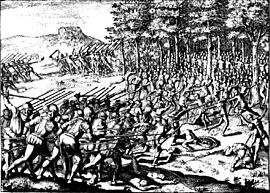This is a guest post by Angie Goodwin, one of IHR Digital’s interns from the West Virginia University.
 Dr Manuel Llorca (University of Chile) presents his findings on a rare subject of history; the relationship between the Mapuche of Chile and British sailors. The lecture is based on a series of governmental documents and maritime logs, letters and diaries. Llorca’s intent is to give an explanation about the evolution and importance of the Mapuche and European relations. The lecture presented gives a wider audience for study and further understanding of the inhabitants of the area.
Dr Manuel Llorca (University of Chile) presents his findings on a rare subject of history; the relationship between the Mapuche of Chile and British sailors. The lecture is based on a series of governmental documents and maritime logs, letters and diaries. Llorca’s intent is to give an explanation about the evolution and importance of the Mapuche and European relations. The lecture presented gives a wider audience for study and further understanding of the inhabitants of the area.
The Mapchue natives are hypothesized to belong to the Arawak Indians from the Amazon region that migrated throughout South America and the Caribbean Islands. The Spanish were the first Europeans to surmount the region; they easily dominated most native tribes that stood in their path of conquest. The Mapuche proved to be more of a challenge than some of the other tribes. Their extensive knowledge of the diverse terrain proved to be their greatest assets. The Spanish and Mapuche attempted several treaties over the three hundred years of fighting. All treaties were to no avail until 1810 and the long awaited Chilean Independence. The Mapchue’s ordeal with the Spanish made them to be cautious and even aggressive toward any outsider entering tribal territory.
The Mapchue found a commonality with one group of Europeans, the British. They both needed the Spanish out of the way for political and economic reasons. From this common ground they built a working relationship. The southern outpost of Concepcion was a port of call for many seafaring men. Those who would founder on a reef or be over thrown by the vicious weather of the South Seas would find themselves beyond rescue. The men would fall to the elements, starvation or at the hands of the natives. After Chile received its independence the demeanor of the Mapuche began to slowly shift from hostile to amiable. The British population grew and in 1823 the first consular was appointed in the city of Concepcion. In order to maintain this bridge of unity between the British and Mapchue a trade system was established. For all stranded sailors returned the Mapuche received goods from the British. Because of the assistance of the Mapchue the survival rate climbed for those shipwrecked and stranded.
way for political and economic reasons. From this common ground they built a working relationship. The southern outpost of Concepcion was a port of call for many seafaring men. Those who would founder on a reef or be over thrown by the vicious weather of the South Seas would find themselves beyond rescue. The men would fall to the elements, starvation or at the hands of the natives. After Chile received its independence the demeanor of the Mapuche began to slowly shift from hostile to amiable. The British population grew and in 1823 the first consular was appointed in the city of Concepcion. In order to maintain this bridge of unity between the British and Mapchue a trade system was established. For all stranded sailors returned the Mapuche received goods from the British. Because of the assistance of the Mapchue the survival rate climbed for those shipwrecked and stranded.
To listen to this podcast click here.
The speaker has also published this paper as an article: see here for details.
